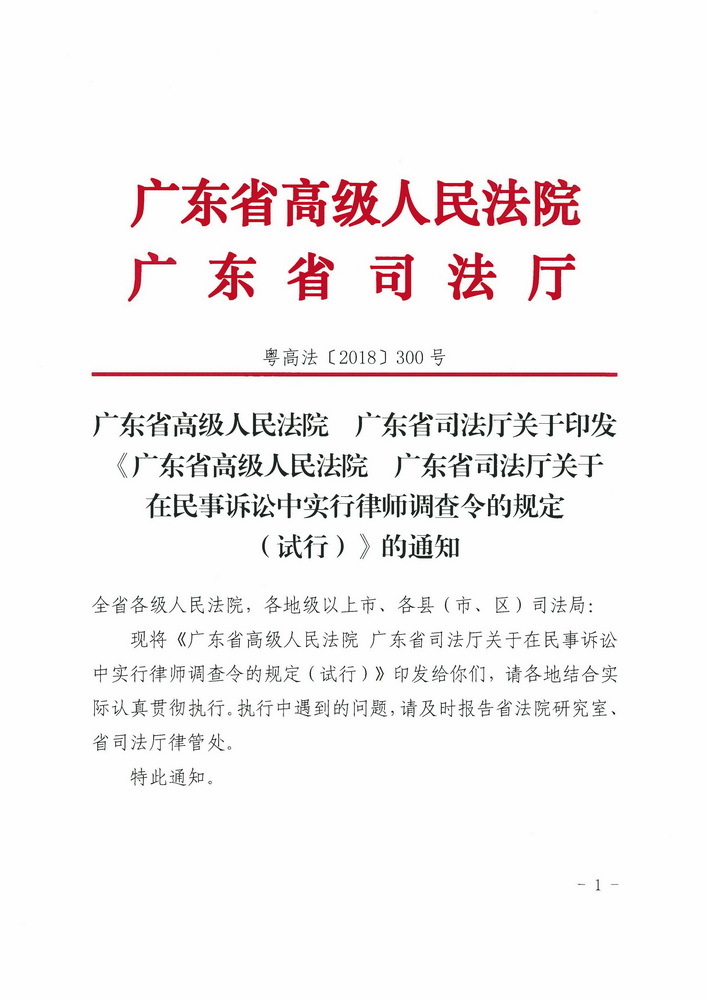Resource Center
No data
Provisions on the Implementation of Lawyers' Investigative Orders in Civil Litigation (Trial Implementation)
Publish Time:
2025-05-14

To protect the legitimate rights and interests of the parties involved and to fully utilize the role of lawyers in legally investigating and collecting evidence, this regulation is formulated in accordance with the relevant provisions of the Civil Procedure Law of the People's Republic of China, the Lawyers' Law of the People's Republic of China, the Interpretation of the Supreme People's Court on the Application of the Civil Procedure Law of the People's Republic of China, and the Guangdong Provincial Implementation Measures of the Lawyers' Law of the People's Republic of China, combined with judicial practice.
Article 1. The lawyer's investigation order referred to in these Regulations refers to a legal document that allows a lawyer to investigate and collect relevant evidence from a unit or individual subject to investigation. This is issued by the people's court upon the application of a lawyer representing a party in civil litigation when the party and their lawyer are unable to collect the relevant evidence for objective reasons.
Article 2. Applications for a lawyer's investigation order may be submitted during the stages of filing a lawsuit, trial, and execution. Lawyer's investigation orders are not applicable during the retrial review stage.
During the lawsuit filing stage, the application for a lawyer's investigation order should be submitted after submitting the complaint and related evidence. The evidence to be investigated should be limited to evidence related to jurisdiction and acceptance.
During the trial stage, the application for a lawyer's investigation order should be submitted after the case is accepted and before the expiration of the evidence submission period.
During the execution stage, the application for a lawyer's investigation order should be submitted before the completion of execution. The evidence to be investigated should be limited to evidence related to the assets and actual performance capabilities of the person subject to execution.
Article 3. Evidence investigated and collected using a lawyer's investigation order should be documentary evidence, electronic data, audio-visual materials, appraisal opinions, and inspection records kept by the unit or individual subject to investigation and directly related to the facts of the case. However, this does not include witness testimony or physical evidence.
Article 4. The following materials should be provided when applying for a lawyer's investigation order:
(1) Application form;
(2) Power of attorney from the party;
(3) Letter of assignment from the lawyer's firm or legal aid letter from the legal aid agency;
(4) Valid practicing certificate of the lawyer;
(5) Commitment letter for the use of the lawyer's investigation order.
Article 5. The application for a lawyer's investigation order should include the following information:
(1) Case number or receipt number;
(2) Name, ID number, or name and unified social credit code of the applicant party;
(3) Name, lawyer's license number, and name of the law firm of the applicant;
(4) Name or name of the unit or individual subject to investigation;
(5) Purpose and reason for investigation and evidence collection;
(6) Evidence and property leads that need to be investigated and collected;
(7) Other matters that need to be explained.
The application form should list the investigation matters in detail, be signed or stamped by the lawyer, and stamped with the law firm's seal.
Article 6. After legal review, the lawyer's investigation order is issued by the chief of the filing division during the lawsuit filing stage, by the presiding judge or sole judge during the trial stage, and by the director of the execution office or a designated judge during the execution stage.
The people's court should decide whether to issue a lawyer's investigation order within seven working days from the date of application.
If the people's court decides not to issue the order, it should inform the applicant and explain the reasons. If informed orally, it should be recorded in the file.
Article 7. A lawyer's investigation order will not be issued under any of the following circumstances:
(1) Involving state secrets, personal privacy, or trade secrets;
(2) Lacking relevance or necessity to the fact to be proved;
(3) Evidence not kept by the unit or individual subject to investigation;
(4) The evidence to be investigated is unclear or not specific;
(5) Other circumstances where it is inappropriate to investigate and collect evidence using a lawyer's investigation order.
For evidence involving the above items (1) and (5), the party may submit evidence leads and apply for the people's court to investigate and collect the evidence according to law.
Article 8. The lawyer's investigation order should include the following information:
(1) Case number or receipt number and number of the lawyer's investigation order;
(2) Name of the applicant party;
(3) Name, gender, license number, and name of the law firm of the lawyer;
(4) Name or name of the unit or individual subject to investigation;
(5) Evidence and property leads that need to be investigated and collected, and relevant requirements for providing evidence and property leads;
(6) Effective period of the lawyer's investigation order;
(7) Name of the issuing unit, date of issue, and court seal;
(8) Contact person and contact information of the people's court;
(9) Legal consequences of refusal or obstruction of investigation.
Article 9. The format of the lawyer's investigation order is uniformly formulated by the provincial court. All levels of people's courts implement unified numbering management for lawyer's investigation orders issued by their courts. The lawyer's investigation order, application form, lawyer's investigation order return receipt, and commitment letter for the use of the lawyer's investigation order, and other related materials are filed and archived.
Article 10. The effective period of the lawyer's investigation order is determined by the people's court based on the specific circumstances of the case, with a maximum of fifteen working days.
The lawyer's investigation order automatically expires upon expiration of the period. If the lawyer is unable to complete the investigation within the effective period for justifiable reasons, they may reapply to extend the investigation order period once.
Article 11. When investigating and collecting relevant evidence from the unit or individual subject to investigation with the investigation order, the lawyer should proactively present the investigation order and practicing certificate and explain the relevant situation.
The unit or individual subject to investigation should promptly provide the relevant evidence according to the investigation content specified in the investigation order. If there are difficulties in providing evidence on the spot, it should be provided within seven working days from the date of receipt of the lawyer's investigation order. If the provided evidence is a photocopy or copy, it should be marked as verified against the original and signed or stamped. The collected evidence can be transferred by the lawyer to the issuing court, or it can be sealed and sent separately to the issuing court by the unit or individual subject to investigation. The lawyer's investigation order can be archived by the unit or organization subject to investigation.
The evidence and information obtained by the lawyer using the investigation order are limited to this case and cannot be disclosed or used for other purposes.
Article 12 If the investigated unit or individual is unable to provide, fails to provide evidence, or refuses to provide designated evidence due to certain reasons, the reasons should be stated in the lawyer's investigation order acknowledgment. If the investigated unit or individual fails to state the reasons in the acknowledgment, the attorney should provide a written explanation.
After retrieving the evidence, the attorney should submit all collected evidence and the investigation acknowledgment to the People's Court within five working days. Evidence collected using the lawyer's investigation order must be verified or confirmed through legal procedures before it can be used as the basis for determining the facts of the case or taking enforcement measures.
If the lawyer's investigation order is not used due to certain reasons, it should be returned to the People's Court for filing within five working days after the expiration of its validity period.
Article 13 If the investigated unit or individual believes that the evidence or information specified in the investigation order falls under one of the circumstances stipulated in Article 7, it may submit a written application to the People's Court to revoke the investigation order within ten working days from the date of receipt of the investigation order.
If the People's Court, after review, finds the reasons valid, it shall revoke the investigation order and conduct investigations and collect evidence ex officio as needed for the case handling; if the reasons are invalid, it shall inform the investigated unit or individual in writing and explain the reasons. After receiving the written notice, the investigated unit or individual shall provide the evidence or information specified in the investigation order.
Article 14 If the investigated unit or individual delays or refuses to assist in the investigation without justifiable reason, the People's Court may impose penalties according to the severity of the circumstances, in accordance with the relevant provisions of the Civil Procedure Law.
If units and public officials with the obligation to assist in the investigation refuse to assist in the investigation, the People's Court may report the situation to the relevant competent authorities, or may submit judicial suggestions to the relevant authorities for disciplinary action.
Article 15 If an attorney has any of the following circumstances, the People's Court may decide not to issue a lawyer's investigation order to him/her for six months to two years, or submit judicial suggestions to the judicial administrative organ or lawyer association for punishment or discipline. For serious cases, admonition, fines, or judicial detention shall be imposed in accordance with the law; if a crime is constituted, criminal responsibility shall be investigated in accordance with the law.
(1) Forging or altering a lawyer's investigation order to collect evidence;
(2) Forging, altering, concealing, or destroying evidence or information collected with a lawyer's investigation order;
(3) Unilaterally opening sealed evidence of the investigated unit or individual without the permission of the People's Court;
(4) Unauthorized copying, disclosure, or dissemination of evidence that may harm the legitimate rights and interests of others or the public interest;
(5) Using evidence collected with a lawyer's investigation order to make distorted, false, or misleading publicity about the case, affecting the handling of the case;
(6) Using evidence collected with a lawyer's investigation order to defame the reputation of the opposing party;
(7) Failing to submit all collected evidence, the lawyer's investigation order, or the acknowledgment on time without justifiable reason;
(8) Other circumstances of abusing the lawyer's investigation order.
For law firms that fail to conduct strict review or issue certificates in violation of regulations, leading to the abuse of lawyer's investigation orders, the People's Court may submit judicial suggestions to the judicial administrative organ or lawyer association for administrative penalties or industry sanctions.
Article 16 For applications for lawyer's investigation orders in the civil part attached to criminal proceedings, these provisions shall apply accordingly.
Article 17 These provisions shall come into effect from the date of issuance. The "Regulations of the Guangdong Higher People's Court and the Guangdong Provincial Department of Justice on the Implementation of Lawyer's Investigation Orders in Civil Litigation (Trial)" (Yue Gao Fa [2018] No. 300) shall be repealed simultaneously.
Related Knowledge













